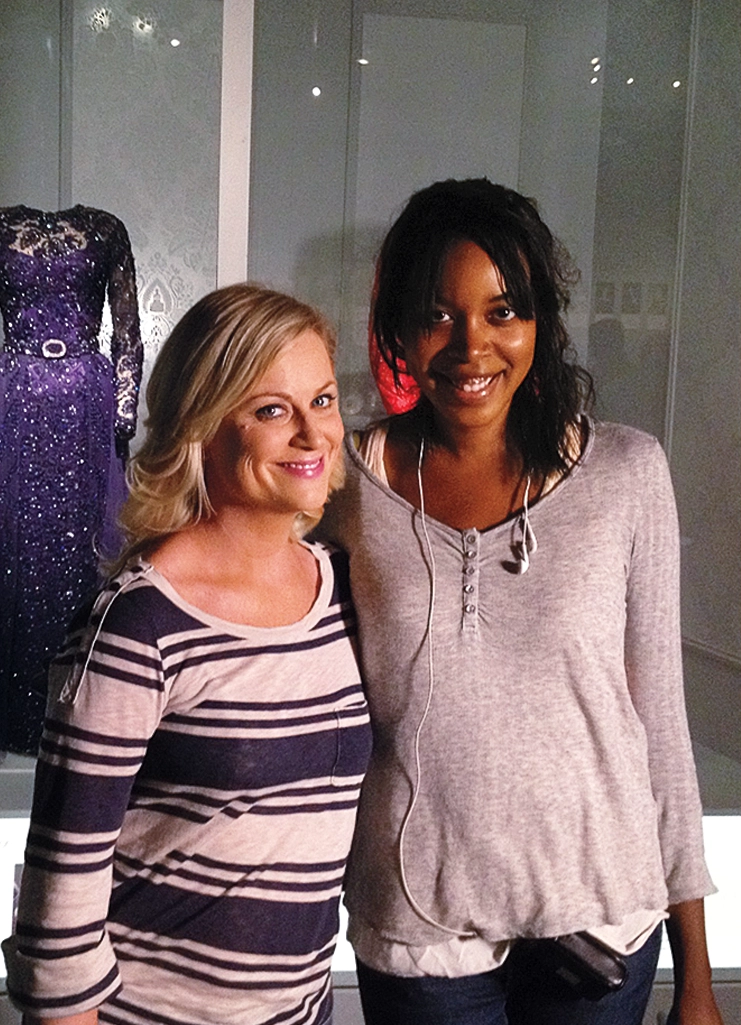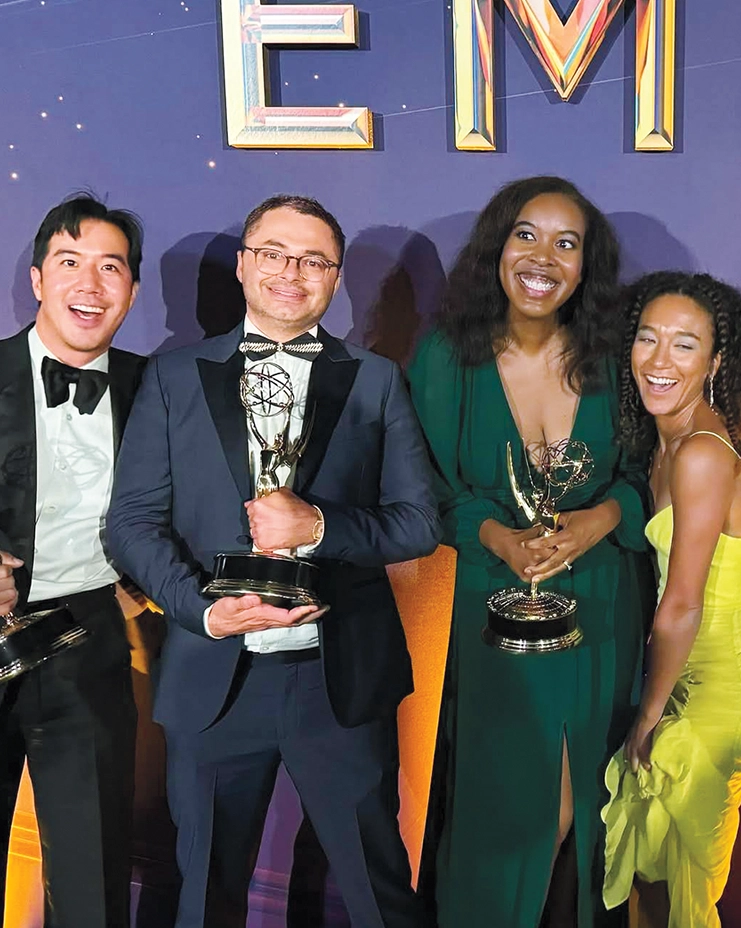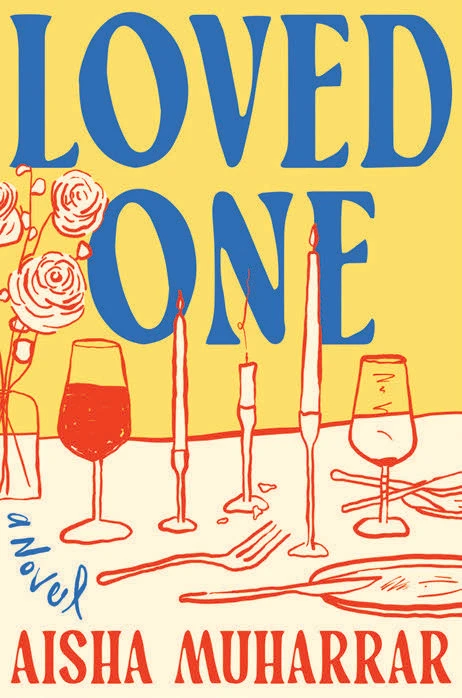Aisha Muharrar ’06 spent six years living inside Leslie Knope’s brain.
Muharrar was three years out of college when she joined the staff of Parks and Recreation, NBC’s sitcom about an offbeat group of employees at a municipal department. The show—centered on Knope, a relentlessly upbeat do-gooder played by actress Amy Poehler—had just finished an uncertain rookie season that nearly got it canceled. Parks and Rec had shown flashes of potential yet still felt ill-defined.
When Muharrar, who this year published her debut novel, Loved One, first interviewed for Parks, what struck the show’s co-creator Mike Schur ’97 was, he says, her “joyous positivity.”

Like Knope, Muharrar loves waffles and being a good student. Schur said she quickly formed a “mind meld” with the character, locking into Knope’s voice, which proved crucial in sharpening the show’s humanity and comic tone. Schur adds that Muharrar learned quickly and became a force “with dialogue, stories, and structure.”
Muharrar had been a professional writer since her teenage years, when she learned that a publisher called Free Spirit Publishing, which specializes in educational books for and about young people, had a book out by a kid her age.
The Columbine shooting had happened recently, and Muharrar was interested in understanding why some teenagers fit in while others become outcasts. She pitched a book about how teens label and divide themselves, which became a collection of reported essays titled More Than a Label: Why What You Wear or Who You’re With Doesn’t Define Who You Are (2002).
Published her senior year of high school, the book helped her get into Harvard, she believes, where she studied English and American literature and language. When her mother, who’d been an English major herself, asked what she was going to do with the degree, Muharrar’s answer, she confesses, was a bit quixotic. “I really liked Dorothy Parker,” she says, “and thought I could live off of writing a humorous short story once a year for The New Yorker or something.”
She became the vice president of The Harvard Lampoon. Among the pieces she wrote was a satire of nineteenth-century etiquette guides, a reflection of a course she was taking on the nineteenth-century novel. “For that piece and pretty much everything I wrote, I liked writing pieces that had a female narrator,” she notes, since most Lampoon pieces had a male perspective.
But Harvard also inadvertently steered her to more practical work. She tried a screenwriting class her senior year with playwright Brighde Mullins, then a Briggs-Copeland lecturer at the University, who told Muharrar she had “an ear for dialogue” and introduced her to films by director and screenwriter Nicole Holofcener and other women.
Inspired, Muharrar attended graduate school at the University of Southern California to study screenwriting, then took some time off and began writing for a short-lived animated show called Sit Down, Shut Up. That led to an interview, and then a job, with Parks and Rec.
Muharrar credits Schur and the show’s co-creator Greg Daniels ’85 with infusing a collaborative spirit into the writers’ room that matched the onscreen vibe. That enabled her to both find her voice quickly and gain crucial experience. During her first week, she found herself on set, working with Poehler to fix a joke that wasn’t landing. “I can’t overstate the importance of having the opportunity to see how it all comes together, from what we wrote in the script to how the actors interpret it,” Muharrar says.
She also loved how collaboration extended to every department—set design, costumes, props, lighting. “It was exciting to see it more as a collage where I was doing one part of it and then everything else came together,” she says.

And yet, Muharrar decided to (metaphorically) lock herself in a room to write a novel. She first started thinking about Loved One after Parks and Rec ended in 2015, although it took years to evolve, with the first words appearing on the page in 2018 and the book going out to publishers in 2022. “I met Ann Patchett in a bookstore, and I said to her, ‘I work in TV but I’m working on this silly thing,’” Muharrar recalls. “And she said, ‘Writing a novel is not silly.’ And so I realized I had to take it seriously.” By then, she’d also written for Schur’s The Good Place and Hacks; her work for the latter won an Emmy.

Loved One, which was released in August, is about a woman named Julia, whose best friend, Gabe, an indie rock star, has just died tragically young. Julia and Gabe dated briefly at 17 but only recently considered the idea that they belonged together—even though Gabe had been living with another woman, Elizabeth. The book takes readers backward through Julia and Gabe’s relationship even as it moves forward through her grief and her denial of her true feelings while she develops a hesitant friendship of sorts with Elizabeth.
Muharrar wrote the book in the aftermath of two peers’ deaths: Parks and Rec writer Harris Wittels and young adult novelist Ned Vizzini. Both died in their early 30s. “I had experienced a lot of grief, but I also did a lot of research,” Muharrar says. “And one thing I learned is that people just respond in the strangest ways to grief and that it can be all-consuming.” She kept an Elisabeth Kübler-Ross quote in mind—“There is a grace in denial”—because, as Muharrar says, “you can’t really grasp it all.”
Loved One is funny in parts, but Muharrar believed she was writing a novel about grief until an editor told her, “I think it’s about love.” At first, she got defensive, viewing that suggestion as “sappy,” but then she realized the book is about both. “You can’t feel grief unless you’ve felt love,” she says, “so they’re completely intertwined.” It’s only natural that a person filled with joyous positivity would, in a novel about grief, make her way toward love.









